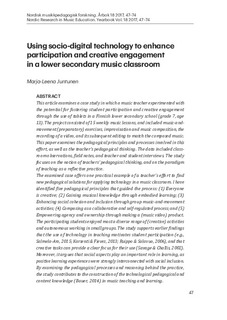Using socio-digital technology to enhance participation and creative engagement in a lower secondary music classroom
Chapter, Peer reviewed
Permanent lenke
http://hdl.handle.net/11250/2490537Utgivelsesdato
2018Metadata
Vis full innførselSamlinger
- Artikler og bokkapitler [390]
Originalversjon
I: Nordic Research in Music Education. Yearbook Vol. 18 2017, s. 47-74Sammendrag
ABSTRACT -
This article examines a case study in which a music teacher experimented with the potential for fostering student participation and creative engagement through the use of tablets in a Finnish lower secondary school (grade 7, age 13). The project consisted of 15 weekly music lessons, and included music-andmovement (preparatory) exercises, improvisation and music composition, the recording of a video, and its subsequent editing to match the composed music. This paper examines the pedagogical principles and processes involved in this effort, as well as the teacher’s pedagogical thinking. The data included classroom observations, field notes, and teacher and student interviews. The study focuses on the notion of teachers’ pedagogical thinking, and on the paradigm of teaching as a reflective practice.
The examined case offers one practical example of a teacher’s effort to find new pedagogical solutions for applying technology in a music classroom. I have identified five pedagogical principles that guided the process: (1) Everyone is creative; (2) Gaining musical knowledge through embodied learning; (3) Enhancing social cohesion and inclusion through group music-and-movement activities; (4) Composing as a collaborative and self-regulated process; and (5) Empowering agency and ownership through making a (music video) product. The participating students enjoyed most a diverse range of (creative) activities and autonomous working in small groups. The study supports earlier findings that the use of technology in teaching motivates student participation (e.g., Salmela-Aro, 2015; Karsenti & Fievez, 2013; Ruippo & Salavuo, 2006), and that creative tasks can provide a clear focus for their use (Savage & Challis, 2002). Moreover, it argues that social aspects play an important role in learning, as positive learning experiences were strongly interconnected with social inclusion. By examining the pedagogical processes and reasoning behind the practice, the study contributes to the construction of the technological pedagogical and content knowledge (Bauer, 2014) in music teaching and learning.
Utgiver
Norges musikkhøgskoleSerie
NMH-publikasjoner;2017:8Nordisk musikkpedagogisk forskning;Årbok 18
